About the same time Clarence A. (Trip) Barnes 3rd started his business, Clarence A. Barnes Moving and Storage, he found three people dead in three weeks, all out on Chappaquiddick.
“I was with John Silva who must have been only about 13 at the time,” he remembered. The first body, that of Hugh Jones, the founder of Mytoi, was discovered as the two were out hunting ducks. Mr. Jones was lying on the ground with his nitroglycerin pills still in his hand.
The second body Trip found was also with John Silva. Again the two were out hunting, this time for deer, when they saw a man frozen in his canoe.
“We couldn’t get him out of the canoe and his paddle was stuck in his hand. I called the police. They thought I was joking. At the time, the police only had station wagons, so we had to put the poor man in the canoe into the back of my 1940 Ford truck. We threw a tarp over him and drove to the hospital. What a sight. Then the next week, I saw that Mr. Weston’s groceries were on the ferry and needed to be delivered. So, I picked them up and drove over to his house — it was a boarding house — and found him dead at the bottom of the stairs. I called the police again.”
“It was that time on the island — not a lot of people on Chappy in the winter. Everyone had to look out for one another.”
Fifty-four years later, on a damp early winter day, Trip is at his office, still moving. He stands behind his desk, which is artfully fashioned out of unwanted wood and furniture from his customers’ homes. The dark paneling, wood stove and counter all give the office the feel of an old-fashioned saloon or bank.
“Everything here has been somewhere else,” Trip says. “I like to reuse things. I was recycling before that was even a term.”
Even the building has been recycled. It was once Manuel C. Silva’s house, which Trip bought and moved to 300 State Road.
Trip heads to the basement to find a file and points to dozens and dozens of cabinets. “I never throw anything away. These are great for keeping the records of all my clients and trucks. We are not electronic, though Rose [Willett] is trying to get me to go electric. But there are some things, like licenses, permits, records of repairs and inspections where you just always need to have a hard copy on hand.”
As he walks back into the office’s crowded main space, he points to a time clock. “Well, that is new. I did buy that.”
Rose Willett, who helps Trip run the business, sits at her desk. “He didn’t have a time clock until recently,” she says. “Can you imagine? Running a business for over 50 years without a time clock.”
“Rose is trying to bring me and the business into the 21st century,” Trip says.
“Maybe some day you might even learn how to use email,” Rose responds.
Looking at Trip, who is 6’ 2” with ruddy cheeks, a barrel chest and neat black hair (with only a trace of gray), you’d never know that he is 72. Last year he had quadruple bypass surgery and a new aorta put in. Then, earlier this year, he had half a lung removed.
“I thought I’d paid my dues for smoking Camels with the heart surgery. But apparently not.”
Rose had worked as Trip’s office manager years ago, and came back to help out while he was recovering. “I felt tender mercy for Clarence,” she says.
Over the course of the past year, they’ve decided that Rose and Jeremy Laffin will run the business when Trip retires. Trip’s children, Clarence A. Barnes 4th, Mike Barnes and Elizabeth Barnes are not interested in inheriting it.
“I’m really lucky,” Trip says. “All my kids are great kids. And they are all doing things they love.”
Perhaps Trip feels fine about his kids following their dreams because he and his father were encouraged to pursue theirs. Trip’s grandfather was Clarence A. Barnes, the attorney general of Massachusetts. His father, Clarence A. Barnes Jr. (also known as Clare Barnes), was an advertising executive and the author of the bestselling book White Collar Zoo, among others. Trip grew up on Park avenue in New York city.
“My parents moved into 829 Park in 1937 and bought the place for $14,000 in 1964. The front elevators in that building never worked.”
Trip attended St. Bernard’s, a tony private elementary school for boys on Manhattan’s Upper East Side. Then, when he was 14, he went to visit his grandfather on his mother’s side who worked in the orange business in Florida. One day, his grandfather asked Trip what he’d like to do and he said, “Get my driver’s license.” So that’s what they did.
“I just loved to drive,” Trip says. “Loved it. When I was 14 and 15, I drove the tractor trailer at Peter Pinney’s hay farm, Sweetened Water, in Edgartown. I was so pleased when I figured out how to back the trailer into the barn and realized I could do what grown-ups do.”
At the time, Trip’s family owned more than 90 acres on Chappaquiddick. The house was vast and included 30 rooms.
“My dad bought it with two other guys for 1,800 bucks. I loved it there. When I was 15 or 16, I started coming up from New York all the time, hitchhiking on weekends with George Lehman and Dean Avery. When I was 16, I started driving the milk truck for the Co-op Dairy. I knew everybody.”
When Trip was in his second year at Trinity, a private preparatory school in Manhattan, he told his dad he hated it. His father said, “Trip, don’t tell your mom I said this, but do what you want to do, but try to be the best at it. If you want to be a milkman, be the very best one you can be. Be the best truck driver you can be.”
Trip quit school and moved to the Island, working for Mr. Perry at the dairy and then for Carroll’s Trucking. He lived in the family house on Chappy, but soon moved into a house in Edgartown with his best friend Peter Mitchell. They paid $35 dollars a month for a three bedroom year-round rental.
“It was a great time. Pam Kurth, Ann Winslow, Sue Whiting, Valerie and Leigh Carroll. We’d all hang out and laugh and laugh. To this day, we still get together.”
Trip’s cell phone rings. A customer is wondering when some furniture will be delivered. Even though he’s at his office, he says, “I’ll have to get back to my office and check.” Trip and the customer chat for a bit and then Trip hangs up and tells Rose to call the client back. Rose and Trip discuss a few more deliveries and Trip learns that over the weekend one of his trucks got stuck on a hill in San Francisco for 10 hours. He is annoyed.
“What was he doing bringing a semi into San Francisco? We always downsize into U-Hauls. The streets are just too steep.”
Rose lets him vent. Then they discuss the logistics of Trip’s off-Island delivery for the next day. He will unload furniture, drop that truck off for repair, meet one of his guys with a new truck, pick up furniture and then head to New York to deliver it. It will be a long day.
He looks at the clock. “I’ve got to head home for a minute,” he says to Rose. “I forgot my heart pills.”
As he drives to his home in West Tisbury, Trip points out that there are maps on the floor of the front and back seat of the car. “GPSs and things like that will never be a truck driver’s tool. For a person to know a city, they need to know that this is near that. They need to learn that Fifth avenue goes down and Madison goes up.”
As Trip pulls into his driveway, he points out the wall in front of his house, which is made out of a broken sidewalk. “It’s a bit too fancy looking for around here. I’m hoping that I can grow some climbing hydrangeas or English ivy to quiet it down.”
Trip’s home is a testament to his commitment to recycling. “Everything in this house is from somewhere else,” he says. “The only thing I paid for are the nails.”
As he walks around, he points out where things came from. “Everything for the back house came from Henry Hough’s house, and here’s Mrs. Rattner’s former bathroom. I also have most of her kitchen. But I didn’t like her stove. It was some fancy kind. Miele I think? Anyway, I couldn’t hack it. So I did go out and get this electric stove.” A few empty cans of Campbell’s tomato bisque sit in the sink with a single bowl and spoon.
As he continues into his living room, still looking for his heart pills, he gestures toward a giant flat screen television. “I’ve never paid for a TV in my life. But I guess I did pay for my bed. I got it at Pier 1. Oh, and there’s my mummy in the corner. I think everyone should have one in their home.”
After he finally finds his pills, Trip heads back to his office and checks on his new storage facility located behind his office. Last year, he built a large three-story building for furniture and property storage. While he has two other storage spaces and dozens of old trucks that he rents out for people to store their wares in, this new space is modern, clean and organized.
“John Folino at Cape Building Systems really helped us out. And Cliff Jernegan is overseeing the job for me. There are so many things to think about, loading docks, air, heat — and teaching my guys how to pack these spaces properly.”
Next to the new building sits one of Trip’s old houses, which is up on blocks and metal beams with a new foundation under it. “I want to make this into another space to house my guys in, but the town has all of these new specifications like handicapped bathrooms that may make turning it into apartments financially impossible. I may just have to turn this house into another storage space.”
He shakes his head and walks back toward his office. On the way, he stops and looks at a giant pile of railroad ties. “These were so cheap, I had to buy ‘em. But now I have to figure out what I’m going to do with them.”
When he gets back, Rose and Laurie Medeiros, the office assistant, have questions for Trip. A couple of his guys check in and they discuss work. After they leave, Trip wonders about finding a person to run his antique shop, which sits at the bottom of the road leading to the Tisbury dump.
“Right now it is filled with furniture,” he says. “I need someone with an eye. I’ve got some stuff that, with a little tickling, would be great. And there are some so-what tables, but they might be just the thing for someone.”
Trip then drives out to the airport to check on another second storage space. When he arrives, he notices that a few book boxes are open. He calls the office and learns that a customer no longer wants the books, but asked that they be sure there was nothing personal in the boxes or books before they are discarded.
“We do all kinds of things for people,” he says.
Trip noses through the books for a bit. “I am completely self-educated. Everything I know I’ve learned from reading. Most of the books in my house I’ve read twice. And I always pay attention to what my customers are reading and read that. Also, David points me to good books.” David is David McCullough, Trip’s uncle by marriage.
Once Trip is assured that all is well in the storage unit, he drives to Oak Bluffs for lunch. “The Ocean View is the best place in the world to eat lunch.”
As he drives, he reflects. “I used to have guys from Harvard, Princeton, Yale working for me in the summers. They’d come back year after year. Now there is no housing. These days I have guys from Russia, Bulgaria, and I house them in rooms above the office. The space is more than adequate. Years ago, Rose lived there when her kids were little.”
The thought of housing makes Trip associate to another kind of housing: Vineyard House, which recently had its ribbon cutting for a new campus. Trip was instrumental in founding Vineyard House years ago. This, along with the Preservation Trust and the Agricultural Society, are his favorite Island causes.
“There is a great satisfaction in helping people,” he says. “One family needed to get a piano out of their apartment on Fifth avenue, but had renovated the apartment since their piano had been moved in. We had to lower it out of a third story window, me sitting on the piano on the way down to make sure that it didn’t smash a window or crash into the brick walls. The police were very nice and looked the other way on that one. Looking back, I think they just wanted me out of the city.”
He laughs. “I’ve moved everything and everyone, groceries to the Island, art across the country, fish to New Bedford.” He shrugs. “What can I say? I like going places, moving people.”
Clarence A. (Trip) Barnes 3rd
Age: 72
Born and raised: New York, New York
Moved to Martha’s Vineyard: 1958
Town: West Tisbury
Education: St. Bernard’s in Manhattan, MVRHS class of 2000 Adult Education Program. “I still haven’t done the walk.”
Professions: Proprietor Barnes Moving since 1960, used car salesman, antiques dealer
Former professions: Time Magazine mail clerk, then began handling all of their transport, milkman
Schedule: In the office at 7:45 a.m. (if he is not on the road) and leaves at about 7 p.m. in the winter months and 8 p.m. in summer. Used to work seven days a week. Now six.
Family: Sister Susan Barnes of New York city; sons Clarence A. Barnes 4th and Michael Barnes, and daughter Elizabeth Barnes.
Significant other: Joan Silva. Trip jokes, “Well, you know I’m the Vineyard’s most eligible bachelor. No, seriously, Joan is a great gal. Really a sweetheart. No issues. No bad kids. Not a gold digger. We have a great time together.”
Places travelled other than the 50 contiguous United States: Canada, Mexico, Caribbean. “I do want to go to Europe sometime.”
Number of trucks he owns: “About 50. I’ve never bought a new car, but have bought two new trucks.”
Number of cars he owns: “About 15.”
Number of commercial lots: “Four or five.”
Staff members: “Fifteen or so depending upon the season.”
Pets: “None. I used to have a dog named Smokey who travelled with me everywhere. And then I had Penny.”

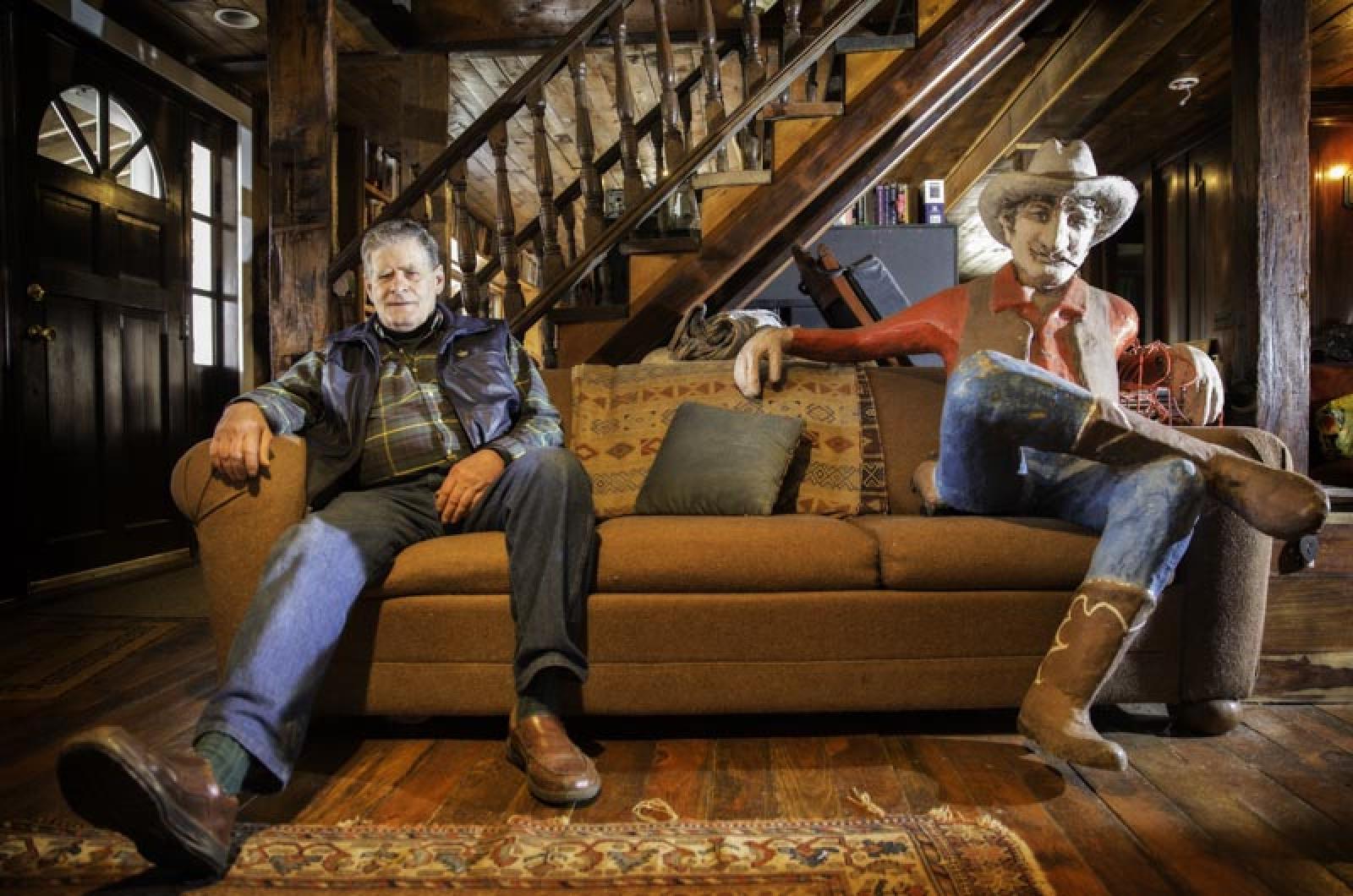
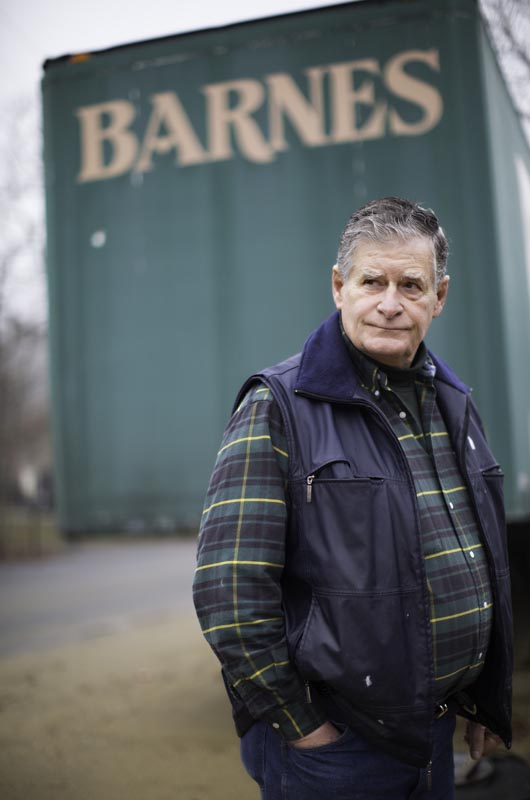
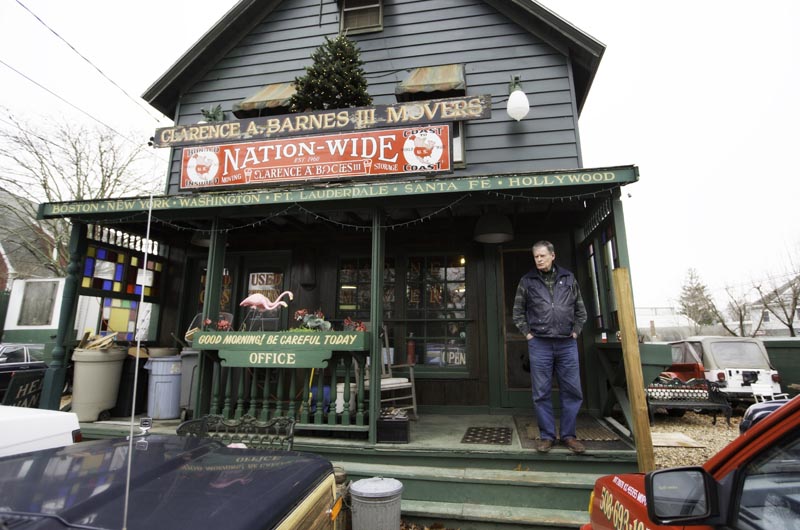
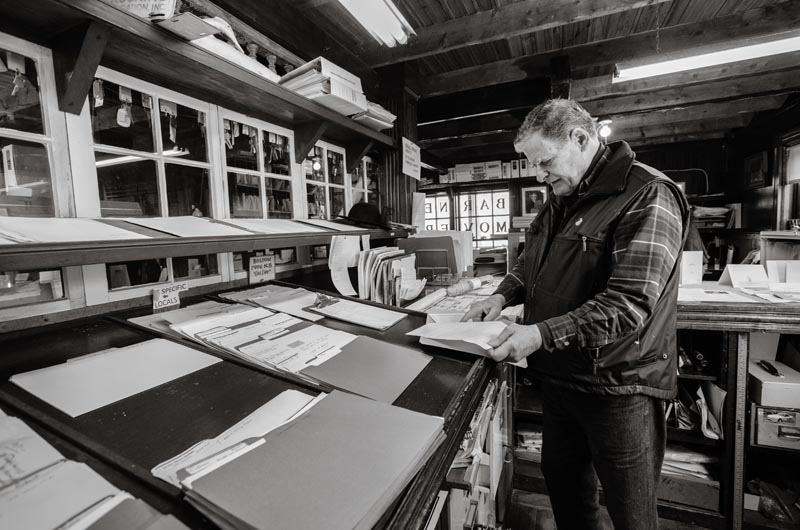
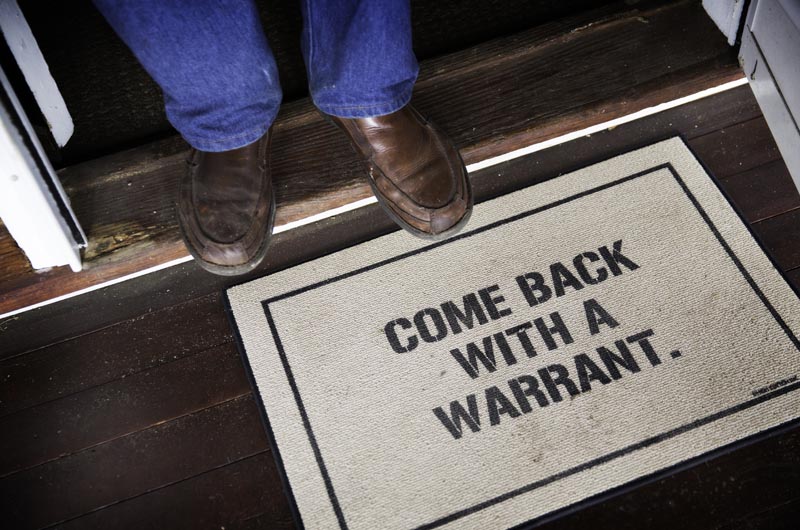
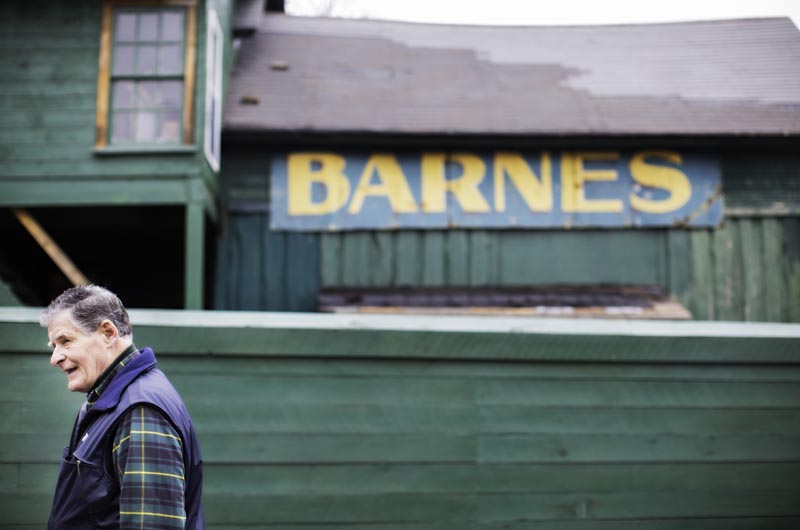


Comments (32)
Comments
Comment policy »